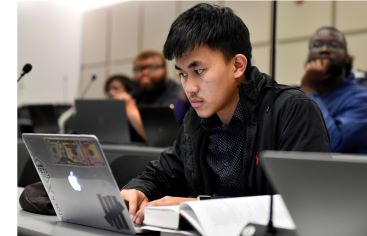
Tech giant Apple enlists UMES as a Community Education Initiative partner
Monday, December 7, 2020
The University of Maryland Eastern Shore is celebrating Computer Science Education Week 2020 by announcing it will expand its curriculum next fall to provide instruction in programming language for Apple’s X-code platform.
The university has been selected to be a “Community Center for Coding and Creativity” – a collaboration between the renowned technology innovator and Tennessee State University.
Apple’s Community Education Initiative supports Tennessee State’s “HBCU C2” efforts to “bring coding and creativity experiences to historically black colleges and universities and their communities.”
“Being designated as a HBCU C2 local center,” said Dr. Derrek Dunn, dean of UMES’ School of Business & Technology, “will provide the needed tools for the university to implement an educational and workforce training program centered around Apple’s Swift programming language.”
Partnering with Apple, Dunn said, “will also allow UMES to encourage the entrepreneurial spirits of students and the Eastern Shore community while expanding their skills for careers in software development.”
Dr. Weiwei Zhu Stone, a UMES computer science professor, will be the project leader responsible for its implementation. She’ll be assisted by Joel Tomlinson, an instructor in the university’s electrical/electronic engineering technology program.
Beginning next fall, UMES will add two courses on coding and application development to its computer science curriculum, including one for non-majors.
“Mobile application development has become very important in the software development field,” Zhu Stone said. “More and more universities are offering the mobile application courses to prepare computer science-major students for careers in software development.”
“Young people represent a majority of mobile app users and have the most creative ideas and inspirations,” she said. “A journalism student needs an app to develop news stories in the field, or a music student wants to compose music using an app in different music styles, or an art student wants to compare several sketches before drawing. They can develop these mobile apps with minimal training using the iOS Swift programming language.”
In addition to exposing UMES students to new academic material, the Apple partnership includes a component that will enable the university to offer people in the surrounding community access to free instruction.
“I believe the course will not only ignite interests in teenagers as mobile app makers,” Zhu Stone said, “but this rewarding experience will also encourage these new programmers to choose UMES as their college of choice.”
The university plans to hold free workshops for secondary school students utilizing Apple’s free coding and creativity curriculum along with Apple devices.
Zhu Stone and Tomlinson “will participate in Apple’s Community Education Initiative Learning Series to learn about coding and app development,” the company said. “As part of that ongoing professional development, educators will explore … ways to engage with learners using Apple’s comprehensive curriculum, which utilizes its easy-to-learn Swift programming language.”
Dunn said he’s appreciative of Apple’s efforts to support UMES and is hopeful the partnership might lead to future collaborations.
Tennessee State, the Apple’s chief higher education collaborator, describes its vision for the HBCU C2 community outreach as “creating opportunities that will diversify the tech workforce by removing barriers, innovating STEM education and developing life-long learning pathways.”
Participating institutions, Tennessee State’s website says, “engage in this effort with key industry partners so that our contribution leads to a more skilled, diverse workforce pipeline for high-demand technical and creative careers.”

